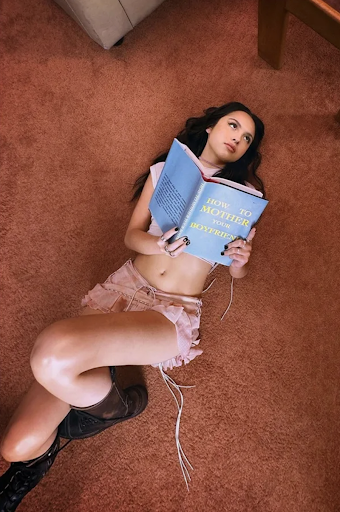Two years after multi-platinum overnight hit “drivers license” launched Olivia Rodrigo into the spotlight, she returns with her highly anticipated sophomore album, “GUTS.”
Although Rodrigo’s career is just beginning, her image has already been put through the wringer, sending her on a rollercoaster of mixed media attention. Rodrigo’s debut album, “SOUR,” dominated the charts for months in 2021; still, the big break was followed by an influx of plagiarism accusations. Controversy about the resemblance between the bridges of “deja vu” and Taylor Swift’s “Cruel Summer” turned many Swifties (Taylor Swift fans) away from Rodrigo, who has previously cited Swift as a childhood idol and inspiration. Soon, nearly every “SOUR” song was being compared to another song, fueling claims that Rodrigo produces overrated and contrived music.
This backlash is unsurprising, as it’s something of a tradition in the music industry for emerging young female artists to be discredited by the media. English rock singer Elvis Costello had a simple response to accusations that Rodrigo copied his music for “brutal.”
“It’s how rock and roll works. You take the broken pieces of another thrill and make a brand new toy,” Costello said, going on to list the Bob Dylan and Chuck Berry songs that inspired his work.
The argument that Rodrigo’s rise has come at the expense of others is not necessarily substantiated, since artists Rodrigo allegedly emulated are all well-established and just as well-off as her. Nevertheless, her success has been tinged with skepticism. The question, “But is she better than Taylor Swift?” (or Lorde? Avril Lavigne?) became ubiquitous, and perpetuated the tendency to frame female artists as each others’ competition or potential replacement.
Additionally, Rodrigo faced scrutiny for writing several songs about her ex, Joshua Bassett, who suffered a wave of online hostility from fans. Some criticized Rodrigo’s failure to “stop the hate” or the fact that “SOUR” was almost entirely a breakup album; her supposed naivete was suddenly manufactured and unlikeable. “GUTS” showcases her artistic prowess and gives her an opportunity to control her own narrative, a topic on which her voice has largely been drowned out.
“I’m the eternal optimist / I scream inside to deal with it,” Rodrigo belts on satirical opener “all-american bitch,” riot grrrl style, which illustrates the impossible duality of the archetype she introduces herself with. “I am built like a mother and a total machine,” she sings softly, speaking to the nurturing yet resilient nature women are expected to have. The tongue-in-cheek lyricism spells out the pressures on women (especially in the public eye) to be accommodating yet tough — and, of course, sexually appealing above all else. “I’m pretty when I cry / Oh, all the time / I’m grateful all the f*cking time,” are delivered with an eye roll behind a saccharine-sweet harmony.
“bad idea right?” is one of multiple pop-rock songs that sound straight from the soundtrack of a campy 2000s teen flick. When she’s pulling up to her ex’s front door, she might be a bit of a self-destructive mess, but, “F*ck it, it’s fine.” Relatable one-liners, largely absent from her debut, are some of the highlights of this record (“I’m sure I’ve been much hotter men, but I really can’t remember when.”)
The lead single, “vampire,” is once again the type of song that leaves people guessing which guy it’s about. But if the media insists on fixating on Rodrigo’s personal life, then so be it — having a reliable business strategy is no crime. Nonetheless, the ballad speaks for itself, featuring a chilling melodic ascent and a bold transition into piano-rock.
“lacy” is another victim to speculation about its subject, but the poetry of the song is what makes it captivating, not the trivial gossip. “People are people, but it’s like you’re made of angel dust,” Rodrigo sings, unable to see her own worth when a hypothetical Lacy is “the greatest thing to ever exist.” Many interpretations overlook the possibility that Lacy symbolizes a concept, namely the ideal set by Eurocentric beauty standards. Being of Filipino descent, Rodrigo has openly shared her experiences of feeling unwanted due to her non-European features. “Lacy, oh Lacy, skin like puff pastry / Aren’t you the sweetest thing on this side of hell?” evokes the same painful longing that Mitski’s “Your Best American Girl” and SZA’s “Normal Girl” do.
“ballad of a homeschooled girl” is so grungy I could picture the hair flips and fingerless gloves. Lyrics like, “I’m on the outside of the greatest inside joke / And I hate all my clothes / Feels like my skin doesn’t fit right over my bones,” cut deep for a generation so hyper-aware of how they are perceived. Rodrigo’s experience may revolve around stepping onto the A-list scene as a self-described introvert, but it still resonates, especially when she transitions into a rap verse about social faux-pas: “I laughed at the wrong time, sat with the wrong guy / Searching ‘How to start a conversation?’ on a website.”
“making the bed” stands out as one of Rodrigo’s most vulnerable songs, candidly depicting the dark side of fame. Soft acoustic guitar creates an intimate ambiance as she sings about the cognitive dissonance of achieving a dream that quickly turns nightmarish: “I’m so tired of being the girl that I am / Every good thing has turned into something I dread.” She reflects on being used (“They tell me that they love me, like I’m some tourist attraction”) and feeling guilty about the inextricable commercialized aspects of her job. The ethereal sound of distorted synth drones exudes an out-of-body feeling; Rodrigo’s ability to acutely capture the vicious cycle of dissociation and self-blame in depression makes the song heart-wrenching.
“get him back!” is an highly quotable, bothered-but-unbothered revenge anthem with an infectious hook. Whoever Rodrigo’s disses target, he was surely thrilled to hear her say, “He said he’s 6-foot-2, and I’m like, dude, nice try.” The conflicted bridge features some of the most memorable lyrics on the album: “Wanna kiss his face… with an uppercut / I wanna meet his mom… just to tell her her son sucks.”
The introspective closer, “teenage dream,” delves into Rodrigo’s imposter syndrome — which takes guts, considering how frequently she is literally denounced as an imposter.
Uncertainty is a prominent motif in this album, which rings true for our generation. The song closes with a question: “They all say that it gets better / It gets better, but what if I don’t?” The beauty of “GUTS” is that it declines to provide simple answers or a neat resolution. In embracing the mess, Rodrigo establishes herself as a rockstar.















